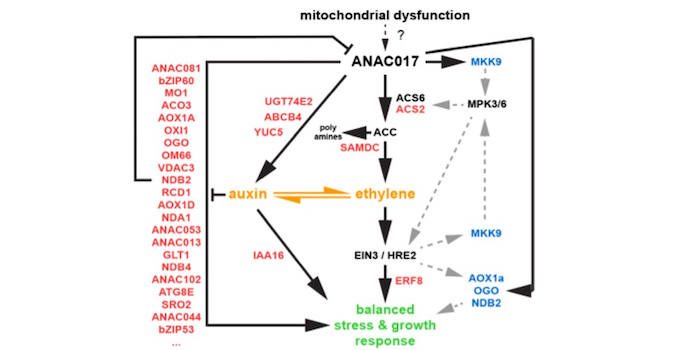ANAC017 balances mitochondrial stress signaling and plant growth
He et al. discover how the transcription factor ANAC017 integrates primary stress responses to mitochondrial dysfunction with whole plant growth.
By Cunman He and Oliver Berkowitz
Department of Animal, Plant and Soil Science, La Trobe University, Bundoora, Victoria 3086, Australia
ARC Centre of Excellence in Plant Energy Biology, La Trobe University, Bundoora, Victoria 3086, Australia
Background: Mitochondria help maintain the energy status of plant cells, act as sensors for cellular homeostasis, and are the origins of a signaling pathway termed mitochondrial retrograde signaling. These functions support the acclimation of plants to environmental changes and adverse growth conditions. Retrograde signaling directly controls gene expression in response to external and internal stimuli and connects mitochondrial function with other organelles, especially chloroplasts. While the integration of these pathways is crucial for plant growth and development, the associated molecular components and their functions are largely unknown. The transcription factor ANAC017 is a master regulator of mitochondrial dysfunction, and several plant hormones, especially auxin and ethylene, contribute to the overall process.
Question: What are the primary targets of ANAC017? Which downstream signaling cascade leads to changes in gene expression, phytohormone levels, and ultimately plant growth?
Findings: We provide mechanistic insight into how ANAC017 recruits ethylene, auxin, and the MKK9-MPK3/6 pathways in Arabidopsis thaliana. Time-resolved RNA-seq revealed an ETHYLENE INSENSITIVE3-dependent, early activation of key genes involved in ethylene signaling and biosynthesis, which promotes the mitochondrial signaling pathway. The subsequent activation of auxin biosynthesis, transport, and conjugation inhibits the retrograde pathway together with RADICAL-INDUCED CELL DEATH1. Several other transcription factors targeted by ANAC017 were determined, including bZIP60, bZIP53, and ANAC081/ATAF2, which control growth-related processes such as senescence and the unfolded protein response. Therefore, ANAC017 is the upstream activator of regulatory feedback loops that coordinate mitochondrial function with whole plant growth.
 Next steps: Manipulating plant signaling pathways to improve crop performance has been challenging. Transgenic approaches often lead to reduced growth or yield penalties due to the activation of stress response pathways under normal conditions. A better understanding of the interconnected regulatory pathways and transcription factors such as ANAC017 will help separate beneficial from detrimental effects in translational research approaches.
Next steps: Manipulating plant signaling pathways to improve crop performance has been challenging. Transgenic approaches often lead to reduced growth or yield penalties due to the activation of stress response pathways under normal conditions. A better understanding of the interconnected regulatory pathways and transcription factors such as ANAC017 will help separate beneficial from detrimental effects in translational research approaches.
Cunman He, Lim Chee Liew, Lingling Yin, Mathew G. Lewsey, James Whelan, Oliver Berkowitz (2022). The retrograde signaling regulator ANAC017 recruits the MKK9-MPK3/6, ethylene, and auxin signaling pathways to balance mitochondrial dysfunction with growth. https://doi.org/10.1093/plcell/koac177



